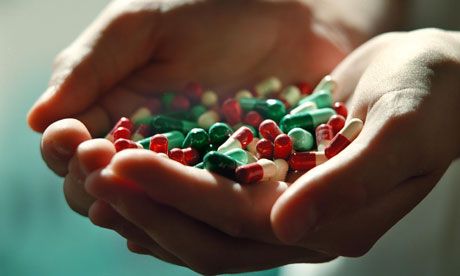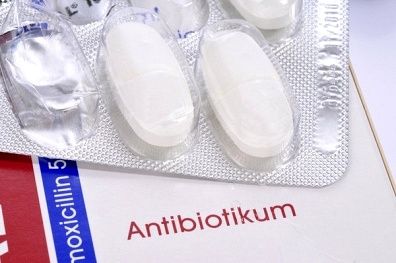Medical expert of the article
New publications
Preparations
Antibiotics and the common cold: when can they hurt?
Last reviewed: 04.07.2025

All iLive content is medically reviewed or fact checked to ensure as much factual accuracy as possible.
We have strict sourcing guidelines and only link to reputable media sites, academic research institutions and, whenever possible, medically peer reviewed studies. Note that the numbers in parentheses ([1], [2], etc.) are clickable links to these studies.
If you feel that any of our content is inaccurate, out-of-date, or otherwise questionable, please select it and press Ctrl + Enter.

Antibiotics and colds are almost always incompatible. Many people, when they get sick, think that antibiotics will help them to recover in all cases. But this is far from true. Since antibiotics were discovered and used in 1941, people still have many misconceptions about them. Let's resolve these misconceptions at least partially.

What should you definitely learn when you have a cold?
If you have a cold and run to the drugstore for antibiotics, of course you hope that they will make you feel better. But it may turn out to be the exact opposite.
Antibiotics can only be useful for treating bacterial infections. And, as practice shows, colds are mainly caused by viral infections, against which antibiotics do not work. Taking antibiotics unnecessarily can only aggravate the danger to your health and increase the risk of harmful microorganisms becoming resistant to antibiotics.
What is the role of antibiotics in treating colds?
Most people have a vague idea of what viruses are and what bacteria are. Therefore, they cannot understand when antibiotics can be taken for a cold and when they cannot. Let's take a closer look at this information and bring clarity to it.
What are viruses?
Viruses are tiny geometric structures that can only reproduce inside a living cell. They range in size from 20 to 250 nanometers (one nanometer is one billionth of a meter). Outside a living cell, a virus is dormant, but when it gets inside, it takes over the host cell's resources and begins reproducing similar viral microorganisms. The body is then poisoned by the virus's toxins, and the person feels weak, very tired, has a poor appetite, not to mention muscle pain and headaches.
What are bacteria?
Bacteria are single-celled living organisms. The average bacterium is 1,000 nanometers in size. If bacteria were the size of a human, a typical virus would look like a small mouse in comparison. And if a virus were the size of a human, a bacterium would look like a dinosaur in comparison – about the size of a ten-story building.
As you can see, bacteria and viruses vary quite a bit in size. You should also know that all bacteria are surrounded by a cell wall. They can reproduce on their own, and they inhabit almost all environments on Earth, including soil, water, hot springs, ice packs, even plant parts and animal organs.
What is the difference between bacteria and viruses in colds?
Most bacteria are harmless to humans. Bacteria in the environment are essential, for example, for the decomposition of organic waste and the recycling of biosphere particles. Bacteria that normally live in the human body can prevent infections and produce substances such as vitamin K. Bacteria in the stomachs of cows and sheep, for example, enable them to digest grass. Bacteria are also important for the production of yoghurt, cheese and pickles. However, some bacteria cause infections in humans. In other words, they are the cause of human diseases.
Antibiotics don't cure colds
Colds are mostly caused by viruses, not bacteria. There are more than 200 different types of viruses that antibiotics are ineffective against. Antibiotics won't help your cold - they can actually make you sick. For example, some people (about one in every 40,000) react to antibiotic treatment with an allergic reaction that can be fatal. Taking antibiotics unnecessarily leads to the growth of several strains of bacteria that are resistant to antibiotics. For these and other reasons, it's important to use antibiotics only when they're needed.
 [ 4 ], [ 5 ], [ 6 ], [ 7 ], [ 8 ]
[ 4 ], [ 5 ], [ 6 ], [ 7 ], [ 8 ]
Side effects of antibiotics
To make matters worse, antibiotics can have side effects. They can kill off beneficial bacteria, which can cause diarrhea, yeast infections, and bacterial infections. Even “gentle” antibiotics like amoxicillin have been known to cause bone marrow toxicity, seizures, acute interstitial nephritis, neuromuscular sensitivity, nausea, vomiting, urticaria and its rash, pseudomembranous colitis, thrombocytopenic purpura, anaphylactic shock, and even death when given in the wrong doses and in the wrong situations.
Antibiotics treat bacterial infections
Antibiotics, which are needed to treat infections and illnesses caused by bacteria, are used to treat conditions such as bacterial bronchitis, pneumonia, strep throat, bacterial ear infection, and red eyes. When antibiotics are used correctly and as prescribed by a doctor, they can save lives.

Sometimes a bacterial infection can be accompanied by a cold virus. Signs that you may have a bacterial infection after a cold include pain in the face and eyes. This pain may worsen when you bend over, and may be accompanied by a cough with thick yellow or green mucus from the nose. These symptoms may occur just during a cold. But if they last more than a week or are severe, then you may have bacterial infections in addition to a cold that require antibiotic treatment.
But it's important to know that antibiotics can only be prescribed by your doctor. So talk to your doctor if you think you need antibiotics.
What is antibiotic resistance?
According to the CDC, antibiotic resistance is one of the world's most pressing public health problems. When bacteria are repeatedly attacked by antibiotics, such as when you take antibiotics for a cold or take them too often, the microbes in your body change. This allows them to stop responding to the antibiotic.
When this happens, your cold will continue to drag on, showing no signs of improvement. Or your illness may suddenly take a turn for the worse. You may even have to seek emergency medical care or go to the hospital for a cold, where you will be given IVs of medications that your body can still tolerate.
Use antibiotics responsibly
Here are three things to remember when you're considering taking antibiotics.
- Listen to your doctor. Before prescribing treatment, your doctor must determine whether your illness is caused by a bacterial or viral infection. He or she will prescribe antibiotics only if necessary.
- Use antibiotics as prescribed. Take all medications prescribed for your illness, at the time and in the manner prescribed by your doctor. If you stop taking the pills before you have finished the course of treatment, you may become ill again.
- Don't use medications just because they are antibiotics. Don't use the principle that if it helped someone, it will help you. All antibiotics are different, they are not the same. When you need a specific medication, consult your doctor.
Antibiotics and colds, as you already understood, can be partners only if you are attacked by a bacterial, not a viral infection. Arm yourself with this knowledge and do not self-medicate.
Attention!
To simplify the perception of information, this instruction for use of the drug "Antibiotics and the common cold: when can they hurt?" translated and presented in a special form on the basis of the official instructions for medical use of the drug. Before use read the annotation that came directly to medicines.
Description provided for informational purposes and is not a guide to self-healing. The need for this drug, the purpose of the treatment regimen, methods and dose of the drug is determined solely by the attending physician. Self-medication is dangerous for your health.

